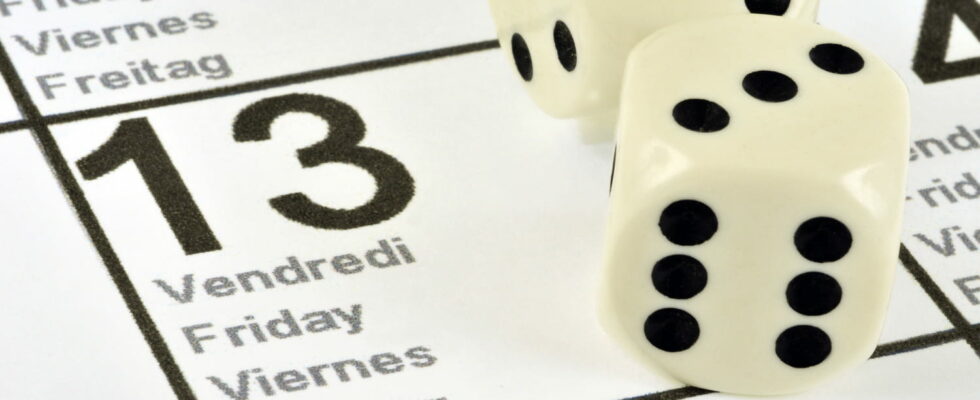FRIDAY 13. While some people prefer to stay at home to make sure they don’t experience misfortune, others, on the contrary, will happily be tempted by a Loto or Euromillions draw this Friday, September 13, 2024.
[Mis à jour le 13 septembre 2024 à 15h07] Superstitious, you’re going to have to pull yourself together! This Friday is Friday the 13th! If you don’t know how this date is different from the others, good for you! On the other hand, if you are well informed and even suffer from paraskevidekatriaphobia, namely “the fear of Friday the 13th”, this is a very complicated day ahead for you! On the agenda for the most fearful? Inaction, inaction and inaction. Don’t leave home, cancel your appointments and especially do nothing at all, such is the mantra of paraskevidekatriaphobics.
But some, starting with the Française des Jeux (FDJ) prefer to surf on this superstition. A superstition that goes back to the origins of Christianity, making this date a so-called unlucky day. Thus, the Loto always has an exceptional sum on Friday the 13th. It is therefore a good opportunity to test your luck, even if, let us remember, the probabilities of winning are exactly the same as for any other draw. Know that the statistics are formal: there is a one in 19 million chance of winning! What changes is the amount to be won. Indeed, this Friday, September 13, 2024, the Française des Jeux is offering a Super Loto with the sum of 13 million euros to be won.
Is Friday the 13th really bad luck?
As the last Friday the 13th approaches in January 2023, the Lastminute.com website had fun probing the superstitions of Europeans. Result: they were 15% to fear this particular day on the Old Continent. Almost as many as those who were afraid of “breaking a mirror” (21%), “walking under a ladder” (20%) or “opening an umbrella indoors” (17%). And more than those afraid of salt shakers, since 15% of Europeans are still superstitious about spilling salt. However, the French remain a little less superstitious than the European average, which is 55%: 52% of us attach importance to superstitions, compared to 60% of the Spanish or 58% of the Italians…
The origins of this phobia are mainly to be found in the Bible: during the Last Supper, the last meal taken together before the arrest and crucifixion of Christ, Jesus and his apostles are 13. But why Friday? It is also the Catholic religion that came to add the number 13, in reference to Good Friday, the day of the Stations of the Cross and penance. At the same time, some legends suggest that Eve bit into the famous apple from the Garden of Eden on a Friday…
What is the origin of Friday the 13th?
This superstition, sometimes ridiculed, has its origins in the Bible: according to the set of texts considered sacred by believers, Christ was crucified on Good Friday, after a last meal, the Last Supper, taken by 13 around the table with his apostles… including the traitor Judas. In Greco-Roman and Nordic mythologies, the number 13 was also already frowned upon, but it is the Catholic tradition that associated the number 13 with Good Friday, the day of penance and the Stations of the Cross. Some legends even suggest in parallel that Eve bit into the apple of the Garden of Eden on a Friday…
What is the story of Friday the 13th?
Nothing special happened on Friday the 13th in the past. The association that links the day of Friday, the number 13 and misfortune is said to have its source in the Bible. According to the New Testament, during the Last Supper (Christ’s last meal), 13 participants sat around the table: Jesus Christ and his 12 apostles. The Gospel of Matthew lists all the people present: “Simon, called Peter, and Andrew his brother; James the son of Zebedee, and John his brother; Philip and Bartholomew; Thomas and Matthew the tax collector; James the son of Alphaeus and Thaddaeus; Simon the Zealot (or the Canaanite), and Judas Iscariot, who betrayed Jesus”. Judas is often presented as the 13th guest, the one who turned everything upside down. Judas the traitor and Friday the 13th are therefore inseparable. The fear of Friday the 13th also rests on the fact that Christ was crucified on a Friday, which would become “Good Friday” during Easter week.
How many Friday the 13ths are there in 2024? The calendar
The year 2024 has two Friday the 13ths, like last year. They fall in September and December. But not all years have a “double Friday the 13th”, since in 2025 there will only be one. As for the year 2026, there will be 3. Find below the next Friday the 13ths on the calendar:
- Friday, December 13, 2024
- Friday June 13, 2025
- Friday February 13, 2026
- Friday March 13, 2026
- Friday, November 13, 2026
- Friday, August 13, 2027
- Friday October 13, 2028
- Friday April 13, 2029
- Friday July 13, 2029
- Friday, September 13, 2030
